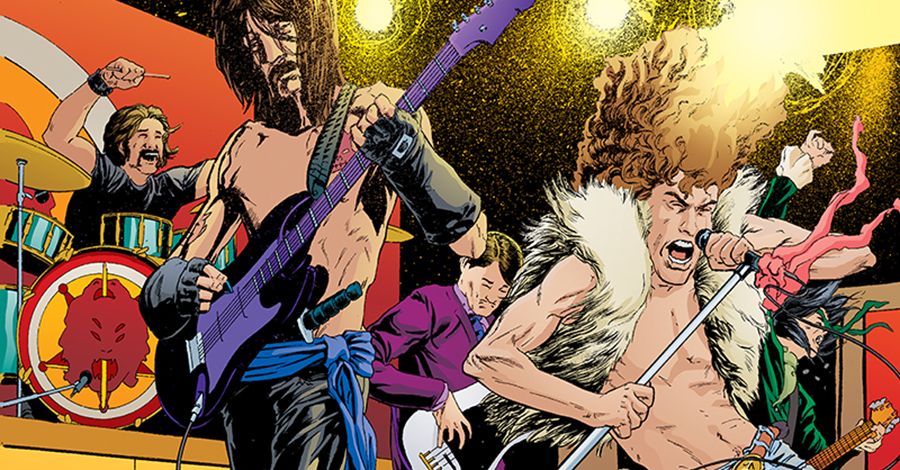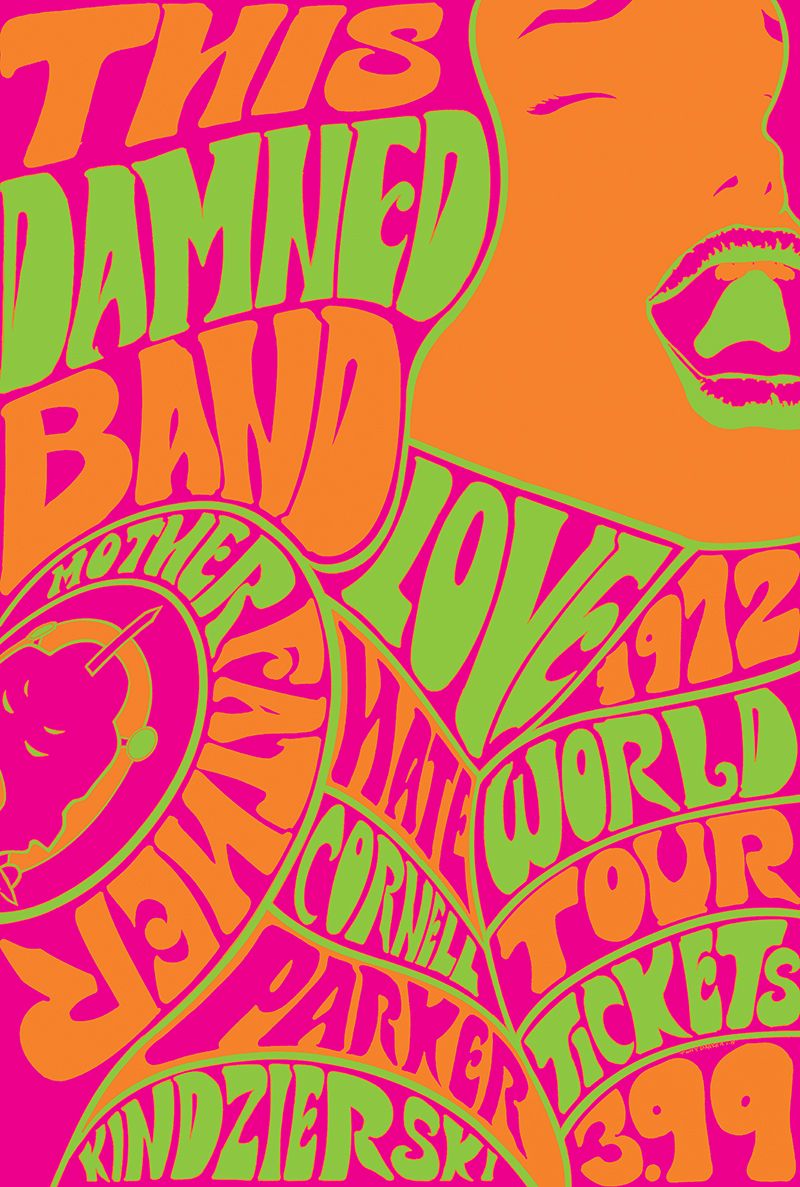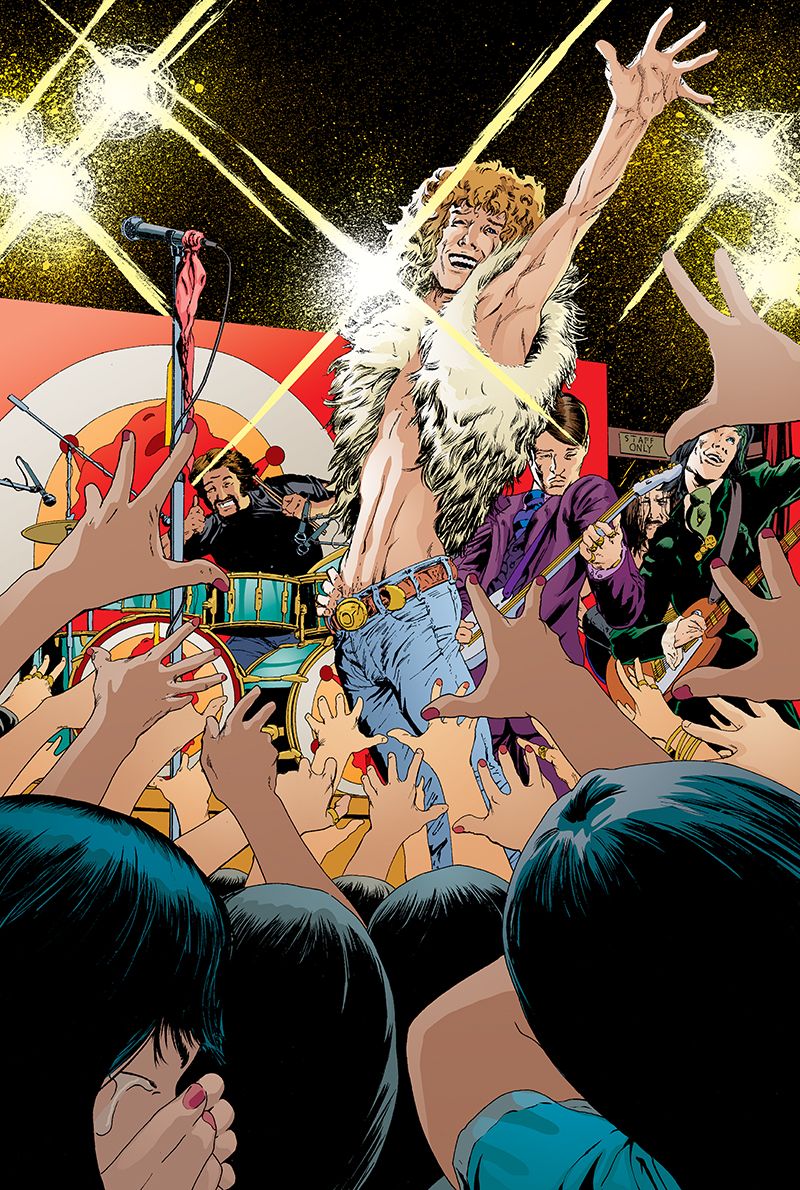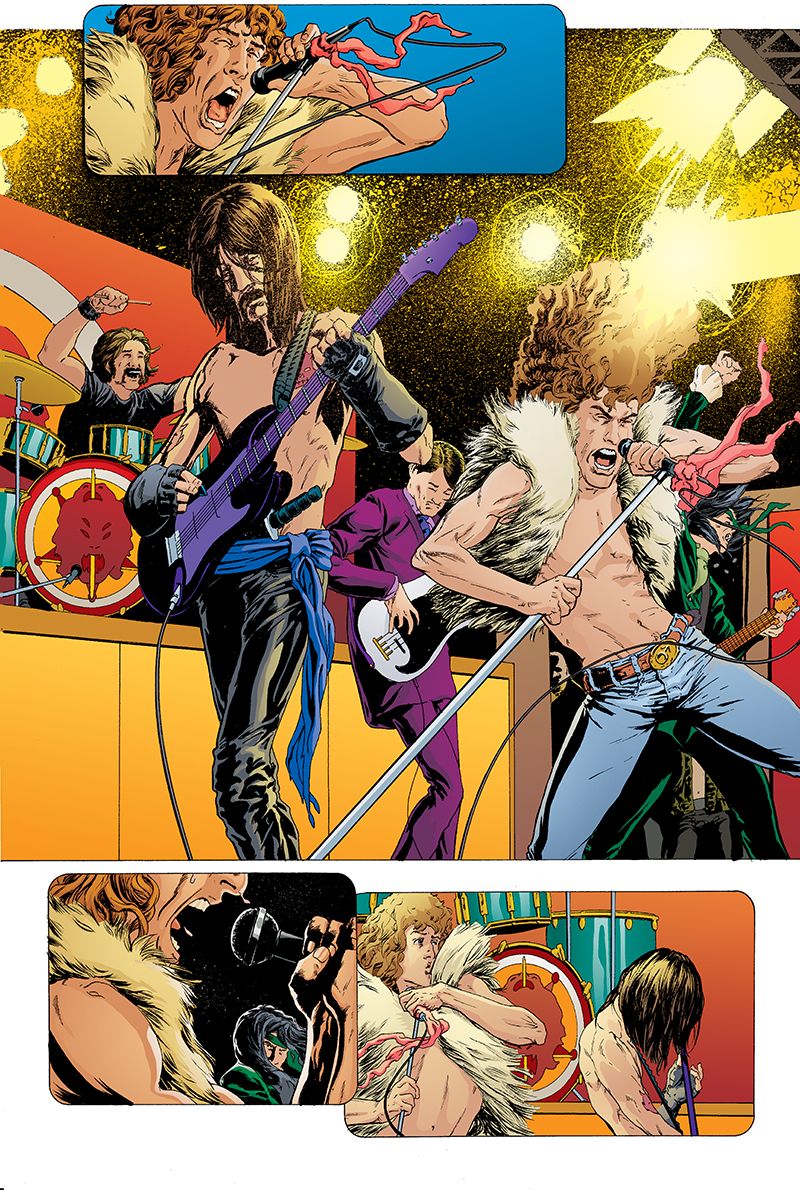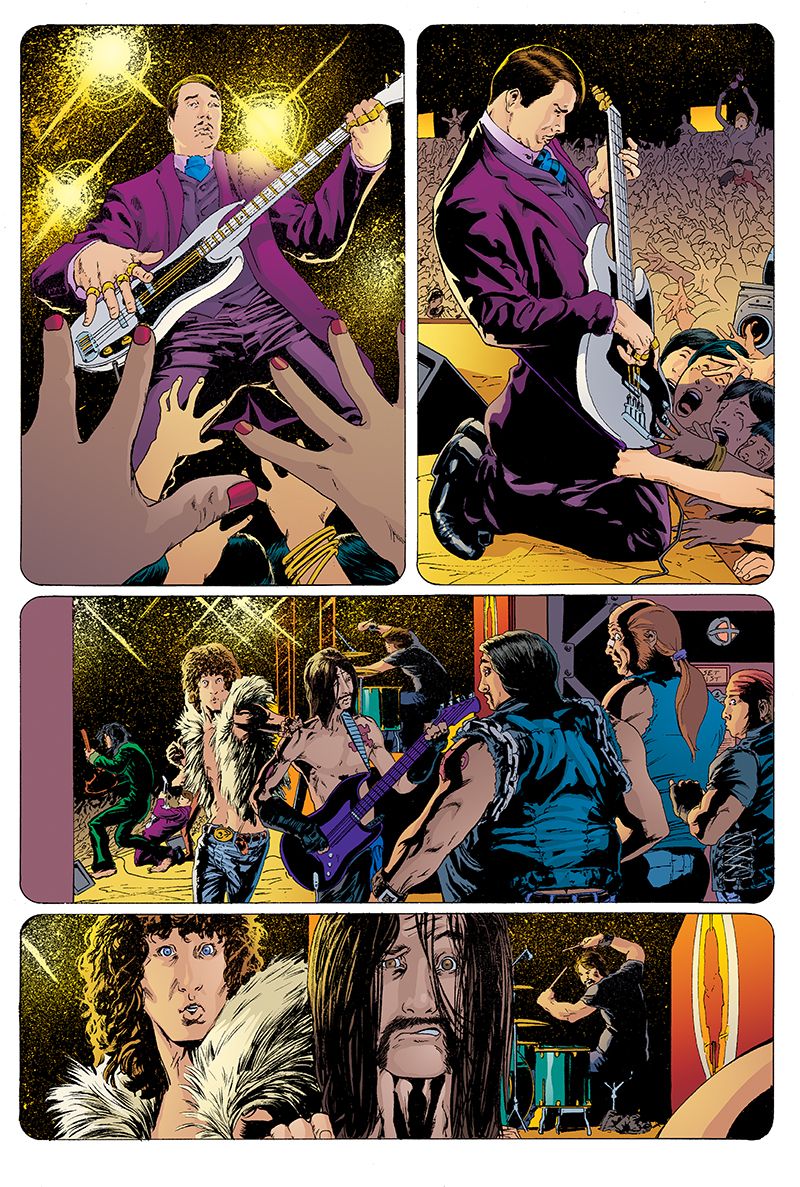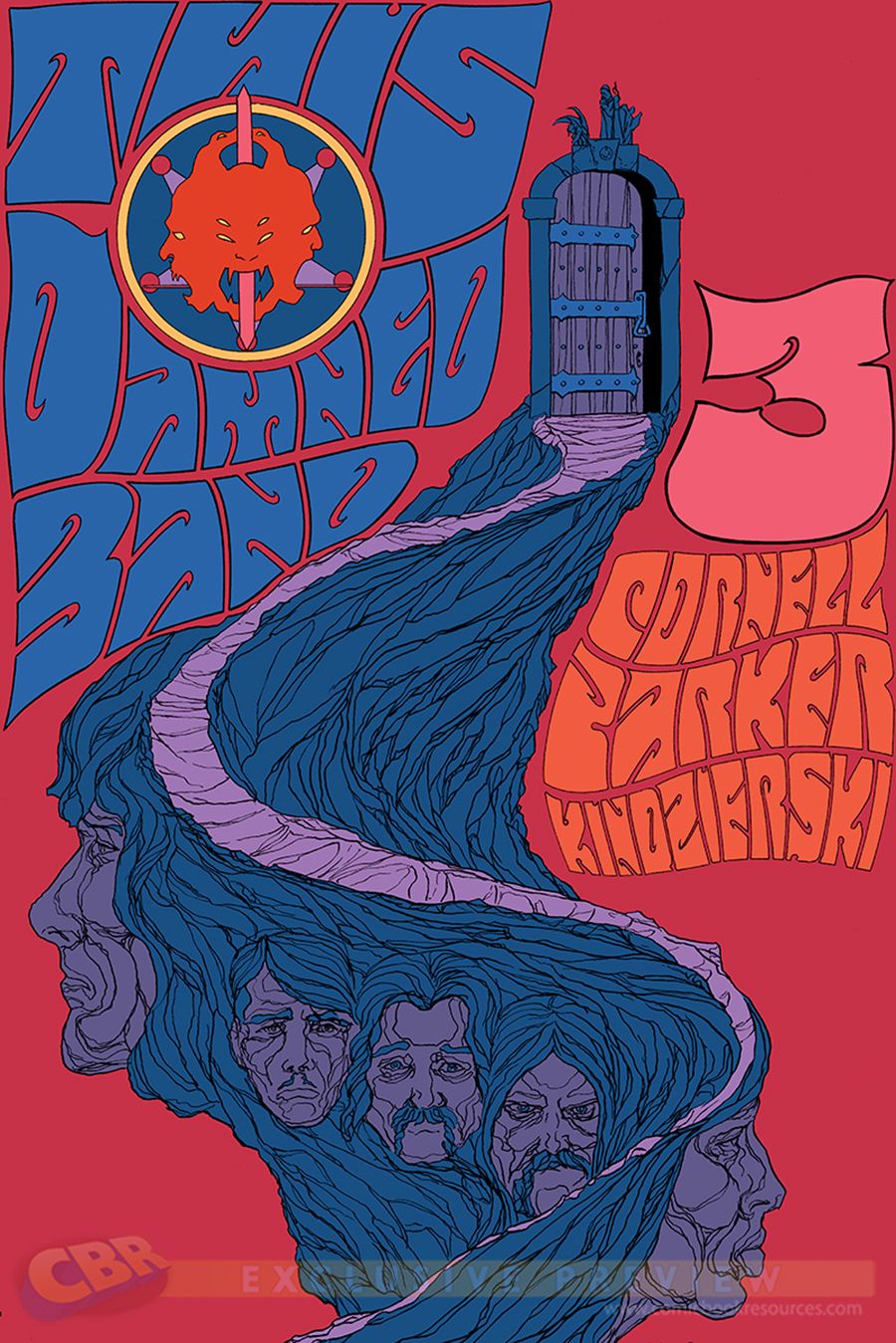The psychedelic neon tour poster that comprises the cover of "This Damned Band" #1 only tells half the story. Underneath the cover's bright colors and the glamorous rock star personalities lurks something darker: black magic. Launching from Dark Horse Comics in August, this new documentary-style comic series follows the black-magic-practicing Motherfather, the hottest band of 1974, as they stumble into something much scarier than they they ever imagined.
The creator-owned series is written by Paul Cornell ("Doctor Who," "Action Comics," "Wolverine") with Tony Parker (Dark Horse's "Mass Effect: Foundation," BOOM!'s "Do Androids Dream of Electric Sheep?") handling both interior and cover art for the series. Eisner-nominated colorist Lovern Kindzierski will also lend his talents to "This Damned Band."
Ahead of the series' debut this August, Paul Cornell and Tony Parker spoke with CBR News about collaborating, replicating that '70s rock and roll vibe and the deeper issues that the seemingly lighthearted story explores.
CBR News: "This Damned Band" takes place in the '70s -- a decade known for notorious rock and roll revelry. What is it about this time period that makes it the perfect setting for this story?
Paul Cornell: That moment in history is the point when rock bands were earning so much money that, for a brief moment, they began to have geopolitical power. Put that together with a bunch of kids who started out playing pubs and the belief systems/poses it was cool to strike back then, and you've got some huge concepts that don't quite fit together -- which is what I love to make stories from.
Our fictional band, Motherfather, is the biggest rock band of 1974. They're plugged into how pop occultism existed back then, from Dennis Wheatley to comic books. It has become clear that, for many real world figures of the time, the flirtation with Satanism had exactly the same depth as some of the more macho stars' flirtation with pretending to be gay. I love it when pretense hits reality head on, so as we say in the tag line: they thought they were "worshiping Satan," but they were actually worshiping Satan.
Tony Parker: The unbridled exuberance for life, and the completely narcissistic, self-absorbed nature of the major players of the era [makes this the perfect setting]. It also gives me a chance to play ludicrous amounts of classic metal and rock while I draw and call it "work related."
For a lighthearted occult music story, there are a lot of background details in this series. Motherfather has a discography that's complete with album covers. Why was it important to do that world-building?
Parker: For me, it was important to give it that secondary layer for fans of the music. Everything has a reason and a purpose, and the deeper that you dig into the history of rock, or the more that you know about it, the more satisfying the experience.
Cornell: Exactly. It's so that people who know this stuff can see that we've done our homework -- or actually been immersed in this stuff from youth -- without letting it get in the way of the story. Also, it was the most fun part to do. Those album covers, thanks to Tony, are particularly arch and "of their time."
Cornell Shares Secrets of Titan's "Doctor Who" Crossover Event
While the documentary/mockumentary style has been popular in TV lately, it hasn't been used in many comics. What makes this format work in "This Damned Band"?
Parker: That was all Paul, but I think it's wonderful. There are nearly no documentary style comics out there, so that by itself separates it from other books. By limiting the camera angles to what an actual camera would capture, it forces me to grow more as an artist. I've been watching a lot of rock and counterculture documentaries from that time in order to get the same feel. Thankfully, with the camera angle experimentation that some directors did at the time, it does help lend itself to a more vibrant graphic novel visual narrative.
Cornell: It lets us see the honking great gap between what these lads are saying and what they actually think. It gives the book a feeling like no other, hopefully. And it brings the funny, especially when you've got Tony's comic timing feeding it.
Dark Horse described "This Damned Band" as "Spinal Tap" meets "Ghostbusters." Besides those iconic films, are there any comics that have inspired the series?
Cornell: Actually, no -- I'm trying very hard for "This Damned Band" to be completely original, in terms of comics. I'm also trying to put a lot of distance between it and "Spinal Tap," because having it just become that again is a real danger. I think anyone who reads the first issue will realize that we're not in the same territory. Weirdly, "This Damned Band" is a bit more realistic than "Spinal Tap," I think. Our band has issues, and some of them are wildly lacking in self-knowledge, but they're not idiots -- some of them are actually pretty smart. Also, we deal with some real world stuff from that time, like the awful place of women in these rock entourages. Most of our band are satirical takes on two or three real world figures mixed together, so every now and then people who know their classic rock will see us winking at them. You run the risk of those archetypes becoming stereotypes, but specifics and a desire to create real characters have saved us from that, I hope.
Parker: I'm purposefully trying to ignore all the horror comics out there right now, so I don't accidentally steal a shot or sequence from someone else. It sucks, as there are some great books that I can't touch for a couple of months. I also love that there's not a specific logo for the book; instead, all of the covers are mock tour posters with their own fonts and designs. The Motherfather logo is on each cover/poster, reminiscent of the Rolling Stones' mouth symbol. I'd like to thank Dark Horse for allowing me to take that risk.
How did each of you get started with this project and what has it been like working together?
Parker: We were brought together by the great editorial staff at Dark Horse. I love those girls and guys. They were very kind to ask me to be a part of this book. Working with Paul has been wonderful as well. He's given great scripts that are well-written and fun to draw. I'll be finished with issue #3 in a few days, and so far we've had only one panel that we disagreed upon. He very politely made his case for the change, and he was absolutely right. Beyond that, he's been very supportive of any of the suggestions that I've made, to the point that it's made me nervous. As a comic illustrator, there's always the guesswork of whether you're translating the writer's vision correctly or completely going off theme. So far it's been wonderful, so I'll do what I can to keep that positive relationship going.
Cornell: Yeah, it's been great. As soon as I know an artist is going to draw what's in the script, then I'm utterly open to them bringing in their own game and offering lots of input -- and that's just what Tony's done. I'm immensely impressed with him. He gives us acting, storytelling, spectacle. The covers are all him. I just mutter a vague idea, and he comes up with these amazing graphics.
From that first cover especially, it seems like the colors really help establish the time period. How has it been working with colorist Lovern Kindzierski?
Parker: It's been an absolute delight. His color theory and palette selection are far above my skills, and I trust him. There have been a few times when I looked at it and didn't initially like what I saw, but after thinking about it for a day or two, I realized that he was absolutely right.
Cornell: [Lovern's] just been Eisner-nominated, and rightly so. The yellow backing on the second cover, for instance, makes you think, "Shit, that's bold," but it's going to yell out from the shelf. These covers look like nothing else out there. Also, Tony's had to draw in several different styles in this comic. The camera crew can't film, for example, the band's drug experiences, so they get a "local artist" to "draw" them, hence the manga-influenced pages in #1. Those pages look brilliant; Lovern suddenly switched to these gentle pastels, which work in ways only a colorist understands.
X-POSITION: Cornell Gives "Wolverine" "Three Months to Die"
Paul, you've written for a number of very established franchises, including "Doctor Who" and the X-Men. What's it like to have free reign over an original, creator-owned book?
Cornell: Just such a delight, a release, me running up and down laughing and screaming. Dark Horse has been great. I like to think we've got relationships set up there that will continue for a long time and many more titles. "This Damned Band" brings together so many threads of my work. That combination of comedy with unease underneath is very me, what my wife calls "ha ha bang." It's good to be able to write a full-on adult book, too, in which we can not just swear and talk about sex and drugs, but also go for irony and let the reader land a few of the punch lines themselves.
Tony -- a lot of the work for establishing the '70s vibe comes through the look of this world, from the costumes and hairstyles to the furniture. What was your process for getting those details right?
Parker: Research. A lot of documentaries, as I want a realistic version and not an idealized movie version. Digital image archives have been useful, but it can be time intensive to avoid the modern versions of what costumers/artists/designers thought it all looked like, filtered through a modern lens. I'm doing what I can to keep everything period, right down to what is considered attractive or repulsive. It's a lot of effort, but worth it.
Dark Horse's "This Damned Band" #1 drops on August 5.

